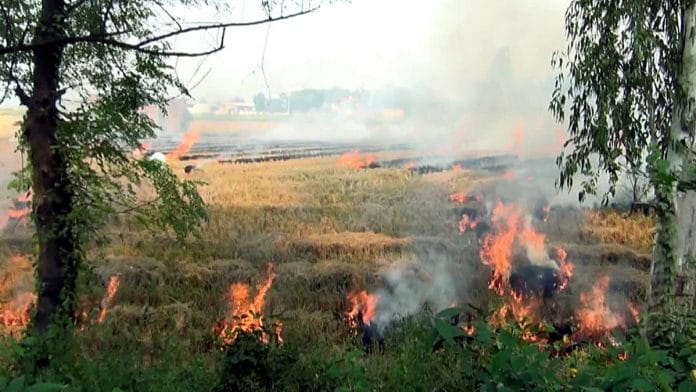New Delhi: An early onset of farm fires in Punjab and Haryana, coupled with a reduced area under paddy cultivation, gives hope that Delhi and its neighbouring areas will get a break from toxic smog this winter.
Central Pollution Control Board (CPCB) member secretary Prashant Gargava said Friday the peak stubble-burning period in Punjab and Haryana is unlikely to coincide with the time when meteorological conditions in Delhi and its neighbouring regions create the toxic smog every winter.
“We saw this year that stubble burning incidents started much earlier than what was seen in the past years. Harvest season has shifted,” he said.
He also said the area cultivating paddy crop has been less in both Haryana and Punjab this year. While Punjab had 22.91 lakh hectares under non-basmati paddy cultivation last year, this year the area has been reduced to 20.76 lakh hectares.
Similarly, Haryana had 6.48 lakh hectares under non-paddy cultivation in 2019. This year, the area has been reduced to 4.27 lakh hectares.
Gargava, however, said lower pollution levels would ultimately depend on the meteorological conditions in the coming weeks. Compared to last year, key meteorological parameters that lead to pollution have been worse so far this year, he added.
For example, the average mixing height — which signifies the height at which pollutants are able to disperse — was higher in September and October last year. A higher mixing height allows suspended particles to rise and dissipate.
Similarly, ventilation index — the speed at which pollutants can get dispersed — has been worse this year, Gargava said.
Also read: These six steps are key to Arvind Kejriwal govt’s war against winter smog in Delhi
Early harvest due to lockdown
Ravindra Khaiwal, an environmental health researcher at PGIMER Chandigarh, told ThePrint that this year’s harvest was late because farmers sowed their crops much earlier than permitted by the administration.
According to an ordinance issued by the Punjab government in April 2008, farmers are prohibited from sowing paddy seeds in nurseries before 10 May and transplanting the saplings to their fields before 10 June.
This ordinance was passed to prevent farmers from irrigating their crops using groundwater entirely, in order to prevent its depletion.
“Due to the Covid-19 lockdown, there was not enough monitoring of when farmers were sowing their crop. As a result, farmers were able to reap their harvests earlier than usual this year,” Khaiwal said.
He, however, added that this was unlikely to cause reduced pollution levels in Delhi because the meteorological conditions already support the accumulation of pollutants.
Also read: Hurdle to investment or disaster in the making? Environmental rules change sparks debate






